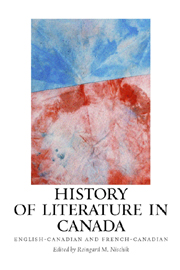Book contents
- Frontmatter
- Contents
- Acknowledgments
- Introduction: Writing a History of Literature in Canada
- I Beginnings
- II The Literature of New France, 1604–1760
- III The Literature of British Canada, 1763–1867
- IV From the Dominion to the Territorial Completion of the Nation, 1867–1918
- V The Modern Period, 1918–1967
- VI Literature from 1967 to the Present
- 21 Sociopolitical and Cultural Developments from 1967 to the Present
- 22 English-Canadian Literary Theory and Literary Criticism
- 23 The English-Canadian Novel from Modernism to Postmodernism
- 24 The English-Canadian Short Story since 1967: Between (Post)Modernism and (Neo)Realism
- 25 English-Canadian Poetry from 1967 to the Present
- 26 Contemporary English-Canadian Drama and Theater
- 27 Canons of Diversity in Contemporary English-Canadian Literature
- 28 Literature of the First Nations, Inuit, and Métis
- 29 The Quebec Novel
- 30 The French-Canadian Short Prose Narrative
- 31 French-Canadian Poetry from 1967 to the Present
- 32 Orality and the French-Canadian Chanson
- 33 Drama and Theater from the Révolution tranquille to the Present
- 34 Transculturalism and écritures migrantes
- 35 The Institutionalization of Literature in Quebec
- Further Reading
- Notes on the Contributors
- Index
33 - Drama and Theater from the Révolution tranquille to the Present
from VI - Literature from 1967 to the Present
Published online by Cambridge University Press: 12 September 2012
- Frontmatter
- Contents
- Acknowledgments
- Introduction: Writing a History of Literature in Canada
- I Beginnings
- II The Literature of New France, 1604–1760
- III The Literature of British Canada, 1763–1867
- IV From the Dominion to the Territorial Completion of the Nation, 1867–1918
- V The Modern Period, 1918–1967
- VI Literature from 1967 to the Present
- 21 Sociopolitical and Cultural Developments from 1967 to the Present
- 22 English-Canadian Literary Theory and Literary Criticism
- 23 The English-Canadian Novel from Modernism to Postmodernism
- 24 The English-Canadian Short Story since 1967: Between (Post)Modernism and (Neo)Realism
- 25 English-Canadian Poetry from 1967 to the Present
- 26 Contemporary English-Canadian Drama and Theater
- 27 Canons of Diversity in Contemporary English-Canadian Literature
- 28 Literature of the First Nations, Inuit, and Métis
- 29 The Quebec Novel
- 30 The French-Canadian Short Prose Narrative
- 31 French-Canadian Poetry from 1967 to the Present
- 32 Orality and the French-Canadian Chanson
- 33 Drama and Theater from the Révolution tranquille to the Present
- 34 Transculturalism and écritures migrantes
- 35 The Institutionalization of Literature in Quebec
- Further Reading
- Notes on the Contributors
- Index
Summary
Drama and Theater in the 1960s and 1970s
THE 1960S AND 1970S WERE A TIME OF radical cultural, ideological, and political change for French Canada. In 1960 the liberal politician Jean Lesage became prime minister of Quebec. With the slogan “Maîtres chez nous” French Canadians claimed their cultural and economic independence from English-Canadian and American dominance. Authorities that had gone unchallenged for centuries were now questioned: Women began to emancipate themselves from patriarchal power structures, and society freed itself from the clerical system of education. The year 1968 saw the founding of the Parti Québécois, which stood for a policy of sovereignty or rather separatism of Quebec from the rest of Canada, and which came to provincial power in 1976. These far-reaching changes and reforms of the 1960s and 1970s have gone down in history as the Révolution tranquille.
Theater at the time was increasingly used for ideological purposes, which was reflected, in institutions as well as in publishing, by the preference for themes connected with Quebec's volatile situation. This new “national” orientation was by no means unanimously welcomed: In 1971 Paul Toupin, for example, explained the rejection of his plays with their irreconcilability with nationalist expectations, “car le nationalisme en art a, au Canada, préséance sur l'art même.” A year later, Pierre Dagenais also expressed this sentiment: “Pourquoi faudrait-il qu'on ne traite que des sujets qui ont rapport avec la situation du Québec? … Un écrivain n'écrit que pour les Québécois? Il doit écrire pour le monde entier.” Theater became a forum for the representation of the province as a “closed society,” thus tying in with Quebec's efforts towards independence.
- Type
- Chapter
- Information
- History of Literature in CanadaEnglish-Canadian and French-Canadian, pp. 478 - 496Publisher: Boydell & BrewerPrint publication year: 2008



